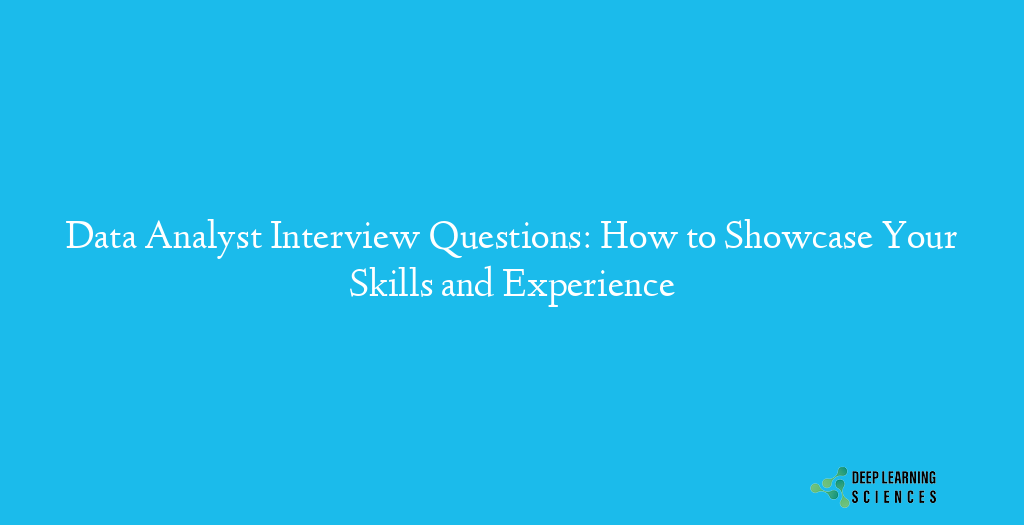Data Analyst Interview Questions: Data analysts play a crucial role in modern businesses, helping to interpret complex data and provide insights that inform key decisions. As the demand for data analysts continues to grow, it’s no surprise that the competition for these positions is fierce. That’s why it’s essential to be well-prepared for data analyst interviews, which often include a mix of technical and behavioral questions. In this blog post, we’ll provide an overview of common data analyst interview questions, strategies for answering them, and tips for preparing for your next interview. Whether you’re just starting your job search or looking to take your data analyst career to the next level, the insights in this post will help you ace your next interview and land your dream job.

Common/Basic Data Analyst Interview Questions
Data analyst interviews typically include a range of technical and behavioral questions that are designed to assess your skills, experience, and fit for the role. Here are some of the most common questions you can expect to encounter:
Technical Questions:
- Explain the difference between supervised and unsupervised learning.
Supervised learning is a machine learning technique where the model learns from labeled data to make predictions on new data. In contrast, unsupervised learning involves training a model without any labeled data to identify patterns and relationships in the data. - What is your experience with SQL?
SQL (Structured Query Language) is a programming language used to manage and manipulate data in relational databases. As a data analyst, it’s essential to have experience with SQL, as it’s a common tool for extracting and querying data. Be prepared to answer questions about basic SQL concepts, such as SELECT, FROM, WHERE, and JOIN. - How do you handle missing data?
Missing data is a common challenge in data analysis, and there are several techniques for handling it, such as imputation, deletion, and interpolation. Be prepared to discuss your experience with missing data and your preferred techniques for handling it.
Behavioral Questions:
- Tell me about a time when you had to handle a large dataset.
As a data analyst, you’ll often be working with large and complex datasets. Interviewers may ask about a time when you had to handle a particularly large dataset and how you managed it. Be prepared to discuss how you approached the task, any challenges you faced, and how you overcame them. - How do you communicate technical findings to non-technical stakeholders?
Data analysts often need to communicate complex technical findings to non-technical stakeholders, such as executives or clients. Be prepared to discuss your communication skills and any strategies you use to make technical information more accessible and understandable to non-technical audiences. - How do you prioritize and manage your workload?
As a data analyst, you’ll often be working on multiple projects simultaneously, so it’s essential to have good time management and prioritization skills. Be prepared to discuss your strategies for managing your workload, such as using project management tools, setting deadlines, and delegating tasks.
How to Impress Your Interviewers: Strategies
Answering data analyst interview questions effectively requires more than just technical knowledge. You need to be able to communicate your expertise, demonstrate your problem-solving abilities, and convey your enthusiasm for the role. Here are some strategies that can help you answer data analyst interview questions confidently and effectively:

- The STAR method:
The STAR method is a useful framework for answering behavioral questions. It involves describing a Situation, the Task or challenge you faced, the Actions you took to address the challenge, and the Results you achieved. This approach helps you provide a clear, concise, and structured answer that highlights your skills and accomplishments. - Emphasizing problem-solving skills:
Data analysts are problem solvers, so it’s important to demonstrate your problem-solving skills during the interview. When answering technical questions, walk through your thought process and explain how you approach data analysis problems. When answering behavioral questions, highlight your ability to identify and solve problems in the workplace. - Demonstrating domain expertise:
Data analysts work in a variety of industries, from healthcare to finance to retail. If you have domain expertise in a particular industry, be sure to highlight it during the interview. This can show that you not only have the technical skills for the role but also understand the industry’s unique challenges and opportunities. - Asking thoughtful questions:
At the end of the interview, the interviewer will likely ask if you have any questions. This is your opportunity to show your interest in the role and the company. Prepare a list of thoughtful questions beforehand, such as questions about the company’s data infrastructure, the challenges the team is currently facing, or the opportunities for growth in the role.
By using these strategies, you can demonstrate your expertise, problem-solving skills, and enthusiasm for the role, giving yourself the best chance of success in a data analyst interview.
Also Read: Is Mac better than PC for Data Analysis? Complete Breakdown
Acing Your Interview: Key Tips for Successful Preparation
Preparing for a data analyst interview requires more than just reviewing technical concepts and practicing your problem-solving skills. Here are some tips to help you prepare effectively for your next interview:
- Research the company:
Before the interview, research the company and the industry it operates in. Look for news articles, press releases, and company reports that can help you understand the company’s mission, goals, and challenges. This can also help you identify questions to ask during the interview. - Review common interview questions:
Reviewing common data analyst interview questions can help you anticipate the questions you’ll be asked and prepare effective responses. Look for sample interview questions online or talk to other data analysts about their interview experiences. - Brush up on technical skills:
Reviewing technical concepts and tools is essential for data analyst interviews. Be sure to review the programming languages, statistical techniques, and data visualization tools you’re expected to know. Practice coding problems and data analysis scenarios to hone your skills. - Prepare your portfolio:
Having a portfolio of data analysis projects can showcase your skills and experience to the interviewer. Prepare a portfolio that highlights your most significant data analysis projects, including your approach to the problem, data visualizations, and results. - Practice with mock interviews:
Mock interviews can help you build confidence and prepare for the interview. Enlist the help of a friend, colleague, or mentor to conduct a mock interview and provide feedback on your responses.
Conclusion
Preparing for a data analyst interview requires a combination of technical skills, problem-solving abilities, and effective communication. By understanding the common data analyst interview questions, using the STAR method to answer behavioral questions, showcasing your problem-solving skills, and researching the company, you can impress your interviewers and stand out from the crowd.
FAQs
What are some common data analyst interview questions?
Common data analyst interview questions can include technical questions about programming languages, statistical methods, and data visualization tools, as well as behavioral questions about problem-solving skills, communication abilities, and teamwork.
How should I answer behavioral questions in a data analyst interview?
Behavioral questions in a data analyst interview often use the STAR method, which involves describing the Situation, Task, Action, and Result of a problem-solving scenario. It’s important to be specific and provide concrete examples of your problem-solving abilities.
How can I prepare for a data analyst interview?
To prepare for a data analyst interview, research the company and industry, review common interview questions, brush up on technical skills, prepare your portfolio, and practice with mock interviews.